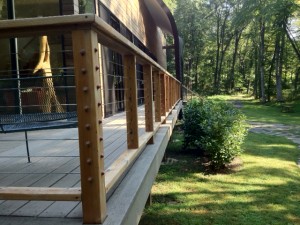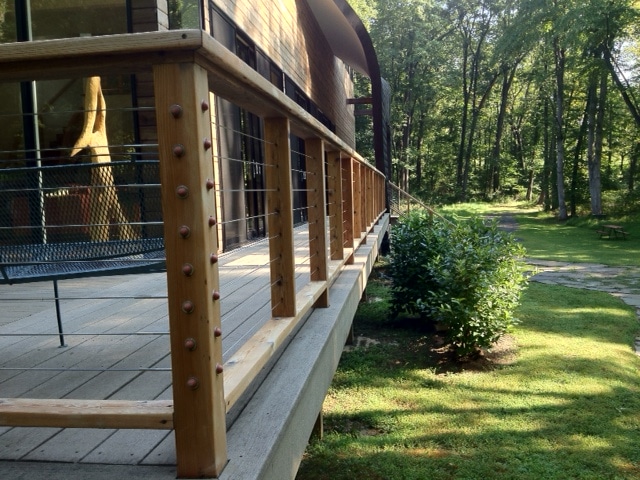Love and Work

It’s Labor Day weekend, and most people won’t think a thing about labor. Work is just what we do to put bread on the table or maintain a lifestyle. Like everything else, we tend to do it mindlessly. But it would be hard to overemphasize the importance of our labor. Freud said, “Love and work are the cornerstone of our humanness.”
In the Bible, work is a part of God’s very nature. In the opening chapters it’s all God does. (It’s a lot of work to create the universe—which is why Sabbath and rest are not just suggested, but commanded.) “If God is the worker,” Elton Trueblood wrote, “. . . then men and women, in order to fulfill their potentialities, must be workers too. They are sharing in creation when they develop a farm, paint a picture, build a home, or polish a floor.”
I’ve been working a lot this last week of vacation, but it’s work that gives me joy. I’ve been cleaning the deck at our house in Pennsylvania. I’ve got cedar railings on the wrap-around deck—maybe a hundred feet of it. Cedar has tannins that leech out and turn brown or black, so I spray it with a special wash, then scrub it and power wash it. When it’s dry, I seal it with a three-inch brush. Before-and-After is dazzling. The black gives way to a gorgeous rosy-tinted wood. I stand in the yard at the end of the day, tired, needing Advil, but feeling deeply gratified. I’ve done something good, beautiful. I’ve had a share, as Trueblood says, in creation.
This weekend, remember that. This is what work is meant to be—an act of co-creation. Seek that for yourself. And remember that every human being needs satisfying work. So pray for the unemployed, and those who are trapped in demeaning work, those who are working only for gain at any personal cost.
Studs Terkel interviewed hundreds of people for his book, Working: People Talk about What They Do All Day and How They Feel about What they Do. When it comes to the American worker, no one tells their story better than Studs. I leave you with a few vignettes, images of how great and funny and sad and glorious our work can be.
“I stand in the same spot, about two- or three-feet area, all night. The only time a person stops is when the line stops. We do about thirty-two jobs per car, per unit. Forty-eight units an hour. Eight hours a day. Thirty-two times forty-eight times eight. Figure it out. That’s how many times I push the button” (Phil Stallings, spot-welder).
“I never listen in on a phone conversation, but I’ll tell you what. I worked for Illinois Bell, and I don’t care who the operator is, the greatest thing is listening on phone calls. [Laughs] When you’re not busy. At the motel, no. At Bell, I did. If you work nights and it’s real quiet, I don’t think there’s an operator who hasn’t listened in on calls. The night goes faster” (Frances Swenson, hotel switchboard operator).
“I only enjoy working on books that say something. I know this is an anathema to people who insist on preserving books that are only going to be on the shelves forever—or on coffee tables. Books are for people to read, and that’s that. I think books are for the birds unless people read them” (Donna Murray, bookbinder).
“Working in the fields is not in itself a degrading job. It’s hard, but if you’re given regular hours, better pay, decent housing, unemployment and medical compensation, pension plans—we have a very relaxed way of living. But the growers don’t recognize us as persons. That’s the worst thing, the way they treat you. Like we have no brains. They have only a wallet in their head. The more you squeeze it, the more they cry out” (Roberto Acuna, farm worker).
“I usually wear myself some black sunglasses. I never go to a funeral without sunglasses. It’s a good idea because your eyes is the first thing that shows when you have a big emotion. Always these black sunglasses” (Elmer Ruiz, gravedigger).

I want that porch in the above picture! Ginny
You wanna clean it? 🙂